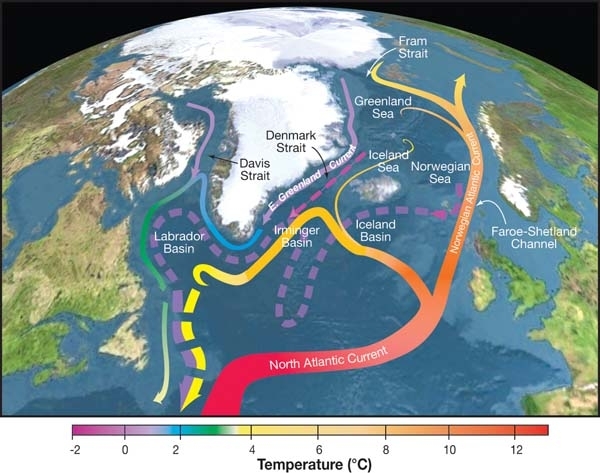
Recent research indicates that the Atlantic Meridional Overturning Circulation (AMOC) may face a risk of collapse this century, or even in the next few decades, with potentially catastrophic consequences. This is a continuously updated and richly quoted research overview exploring current knowledge about the risks, consequences, and potential solutions.
Click on the arrow to the left of statements for supporting quotes and citations
The AMOC is a crucial part of the Earth's climate system, bringing heat to Northern and Western Europe through various ocean currents including the Gulf Stream and playing a significant role in global ocean circulation. However, it is now at risk of collapse or significant slow down which would have profound impacts on Earths' climate and weather patterns. Although understanding when the collapse may happen, or the specific risk associated with it happening is hard to predict, the outsized potential impact warrants investigation and action.

Multiple estimates show AMOC has been gradually weakening. Studies show a decline of approximately 15% since the mid-twentieth century, with more recent estimates indicating a decline of nearly 5% per decade since 1950. This weakening trend is expected to continue. These estimates are primarily based on an indirectly constructed fingerprint for the AMOC based on the correlation between the AMOC and sea surface temperatures as observed from an ensemble of 12 CMIP5 models.
However, contrasting research using correlations between AMOC and air-sea heat flux rather than sea surface temperatures points to no weakening so far. It likewise finds that the correlation between sea surface temperatures and AMOC strength is considerably weaker than previously observed. This result was determined using ensembles of both 24 CMIP6 and CMIP5 models.
Both approaches have considerable uncertainties and limitations including exclusion of relevant AMOC processes such as glacier freshwater melt from Greenland and the Arctic and limitations of observational estimates for air-sea heat flux which include large uncertainties.
TODO: Add Volkov 2024 RAPID 26.5°N correction
While it can be said that evaluations for a slowdown of the AMOC based on fingerprints constructed from correlated variables is currently inconclusive, there are a number of observed phenomena that support the case for a slowdown.
Firstly there is the North-Atlantic cold blob where the leading scientific explanation is a slowdown of the AMOC. (TODO: add https://www.researchsquare.com/article/rs-5314150/v1)
Secondly there is the shifting of the Gulf Stream westwards towards the US, which has long been predicted to result from a slowdown of the AMOC.
Thirdly there is the decrease in salinity in the North-Atlantic where a decline in the seawater density in the subpolar gyre region implies an AMOC weakening of 13% since 1950.
Fourthly there is the corresponding increase in salinity in the sub-tropical South-Atlantic, corroborating the apparant decrease in flow of salty waters to the north.